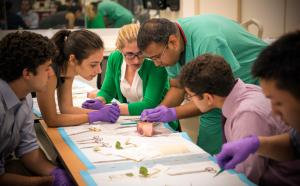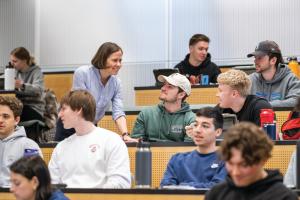Our workshops equip all who teach with evidence-based practices, grounded in research. We prioritize strategies and interventions that have demonstrated effectiveness. We are committed to vetting methods and effective practices ahead of time, ensuring reliability and impact. After each workshop, participants will gain access to resources and works cited via individual URLs, allowing them to explore further and stay informed. Unless noted otherwise, any Ohio State employee is welcome to register for and attend our workshops. We strive to host accessible events that enable all individuals, including individuals with disabilities, to engage fully. To request an accommodation or for inquiries about accessibility, please contact admin-oaadac@osu.edu.
What to Expect
Active Engagement
Studies have demonstrated that Active Learning benefits all students and promotes student success in higher education. As workshop facilitators, we want to model these effective practices.
Drake Institute workshops follow the Active Learning effective practice guideline of keeping uninterrupted presentation of information to 10-15 minutes or less. Each workshop also models a variety of evidence-based strategies and activities for active learning, such as individual reflection, small group or large group discussion, minute papers, or polling/anonymous response options. An important element of Active Learning is continued reflection throughout the process, which is encouraged throughout our workshops.
Transparent Design
We invite instructors to consider transparency in their teaching, so we model this practice in our workshop facilitation. A growing body of research suggests several transparency-related elements of teaching to be important in enhancing the learner experience and supporting academic success.
You can expect to see the following transparent practices modeled in Drake Institute workshops:
- Purpose
- Workshop learning objectives/outcomes are clearly communicated and are motivating to participants
- The purpose of any active learning activity is clearly explained
- Task
- Step-by-step instructions for any workshop activities are explained
- Participants are guided through the process of making changes to their teaching (planning)
- Criteria
- Guidelines/norms are provided for workshop participation.
- Participants are aided in reflecting on what successful implementation looks like in their classroom (how will they know when they’ve implemented the technique well?)
Universal Design for Learning
The Universal Design for Learning (UDL) framework aims to create supportive learning environments that enable all participants to engage meaningfully, and we strive to do the same in our workshops. Each Drake Institute workshop utilizes the UDL framework in its design:
- Multiple Means of Engagement – the “Why” of Learning
- Motivating the content from the perspective of participants with a wide variety of lived experiences, pedagogical commitments, etc.
- Showing its applicability to multiple disciplines and career stages
- Openness for instructor choice – when and whether the principles apply to their teaching
- Multiple Means of Expression – the “How” of Learning
- Varied participation options
- Multiple Means of Representation – the “What” of Learning
- Varied representation in examples, images, videos, research.
- Workshop materials and supplemental content is available in multiple formats

Signature Workshops: Active Learning
Our introductory workshop covers evidence-informed concepts of Active Learning and provides opportunities to explore and learn about a variety of basic, evidence-based strategies that can be incorporated across disciplines, modalities, and teaching contexts. A rotating lineup of additional Active Learning workshops go in-depth on specific topics such as integrating Active Learning into a course plan or taking a deeper dive into one of the many Active Learning strategies.

Signature Workshops: Assessing Student Learning
Our Foundations of Assessment for Learning workshop offers practical ideas and strategies that provide a strong foundation for creating a teaching and learning environment in which assessment serves not only to measure but to enhance student success. Other featured workshops cover a broad range of topics such as classroom assessment techniques (CATs), programmatic assessment, and assessment for the health professions.

Signature Workshops: Educational Technology
Our collection of offerings centered around Educational Technology continues to expand, from fully asynchronous courses in BuckeyeLearn to regular, synchronous workshops in collaboration with experts from the Office of Technology and Digital Innovation (OTDI) Learning Systems group. These offerings are designed to share the pedagogies and practices that underly effective use of the rapidly expanding list of learning technology tools available to instructors at Ohio State.
Evaluation and Iteration
We value and are committed to continuous improvement. We recognize that effective professional learning for educators is ongoing, and we embrace an iterative process to ensure that our offerings evolve in response to participant needs and changing educational landscapes.
We seek direct feedback from workshop participants via post-session polls. Through these polls, we gather data on participant learning outcomes, experience, and impact. Participant feedback enables us to drive meaningful changes. When we identify areas for improvement, we iterate on workshop content, delivery methods, and resources.